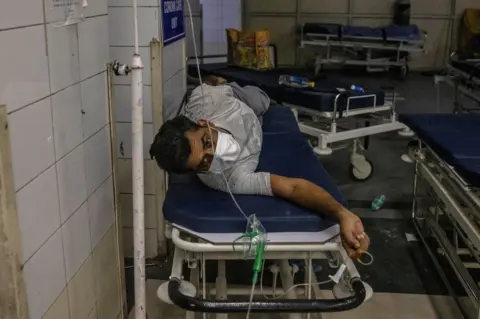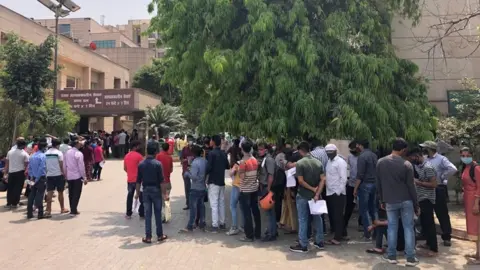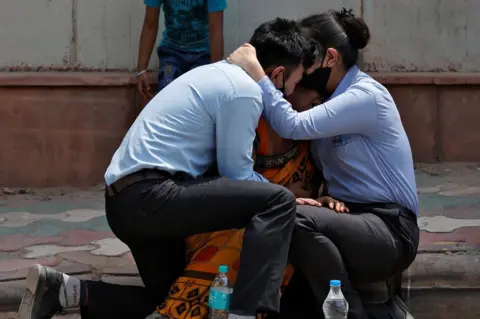India coronavirus: Desperate Covid-19 patients turn to black market for drugs
 Reuters
ReutersAkhilesh Mishra started getting a fever and a cough last Thursday but he initially thought it was just the flu.
Akhilesh began to worry the next day, when his father Yogendra developed similar symptoms. The two men decided to get Covid RT-PCR tests done and tried to book a slot online but the next available appointment was three days later.
They finally managed to get a slot on Sunday. In the meantime, Yogendra was running a very high fever and his doctor advised him to look for a hospital bed, which turned out to be another daunting task. They were turned away by many private hospitals in the city of Noida and also in the capital, Delhi.
The family finally managed to get a bed for him in a private hospital in Delhi and he is now recovering.
Akhilesh had thought he would lose his father.
"I felt depressed," he said. "I feared that he was going to die without getting treatment. No son should have to go through what I went through. Everybody should have equal access to care."
The family's story is not unique. Accounts of family members struggling to find a bed, or life-saving drugs or oxygen cylinders, are being reported all over India. In some cities, there is a long waiting list at the crematoriums.
Allow X content?

Allow X content?

People also have to wait for several hours to get tested for Covid-19 at labs in many cities, including Delhi. And results are coming after 48-72 hours.
"I have had symptoms for three days and it's making me anxious that I have to wait for 2-3 days to get a report," a 35-year-old man said outside a lab in Noida.
Black-marketing of drugs
In recent days in India, social media has been awash with desperate requests for help finding the drugs remdesivir and tocilizumab. The effectiveness of the two drugs is being debated across the world but some countries, including India, have given emergency use authorisation to both.
The antiviral drug remdesivir is being prescribed by doctors across the country, and it is in high demand. India has banned exports, but manufacturers are still struggling to meet the demand. India has been reporting more than 100,000 cases daily since 6 April.

Hetero Pharma, one of seven firms manufacturing remdesivir in India, said the company was trying to ramp up production. The BBC has found that the shortage in supply is leading to black marketing of the drug in Delhi and several other cities. At least three agents contacted by the BBC in Delhi agreed to supply each 100mg vial of remdesivir for 24,000 rupees ($320; £232) - five times the official price. India's health ministry recommends six doses of 100mg vials for a patient for one course of the drug, but doctors say up to eight doses are needed in some cases.
That is a lot of money for a middle-class family. "I had to spend so much money to get the drug, said Atul Garg, whose mother was admitted to a private hospital in Delhi. Finding the drug required "hundreds of calls and many anxious hours", Atul said.
Allow X content?

Tocilizumab, a drug normally used to treat arthritis, has been proven to save lives in some clinical trials. But it has almost disappeared from the market in India.
Rajiv Singhal, general secretary of the All India Chemists and Druggists Association, said his phone was ringing through the day as people asked him to help find the drugs.
"The situation is so bad that I can't even get the drugs for my own family members," he said. "We are trying to take action against those who are black marketing, but I admit that there are leakages in the system."
Oxygen, X-rays and Covid tests
The demand for medical oxygen has also soared in several Indian sates. Several hospitals are turning patients away because they lack supplies. Maharashtra state Chief Minister Uddhav Thackeray asked the federal government to send oxygen by army aircraft, as road transportation was taking too long to replenish the supply in hospitals.
The situation is much worse in small cities and towns. When patients are not able to find a hospital bed, doctors advise them to arrange oxygen cylinders at home.
Nabeel Ahmed's father was diagnosed with Covid on Friday in a small town in northern India. Five days later, he started having difficulty in breathing.
The doctor advised Nabeel to get an oxygen cylinder at home. He had to drive for four hours to another city to pick one up. "It took me eight hours to get a cylinder for my dad while he was struggling to breathe," he said.
Another major problem patients are facing in smaller towns is that private labs are refusing to conduct chest X-rays and CT scans. Doctors often ask for these tests to assess the progress of the disease.
Yogesh Kumar, who lives in the northern town of Allahabad, said the only way for him to get an X-ray done was to either get admitted to a hospital or to get the test done at a government-run hospital, where the waiting list was too long.
A doctor in Allahabad told the BBC: "It's unbelievable that I am unable to get X-rays done for my patients. We have to just rely on blood reports to assess the disease in some cases, which is not ideal."
 Reuters
ReutersBusy crematoriums
Crematoriums in many badly affected cities are running day and night. In some cases, families have to wait for several hours to cremate the deceased. A recent report said that the metal structure of the furnaces inside a crematorium in the western Indian city of Surat had started melting because it had been running day and night without any break.
A short video clip went viral recently showing dozens of funeral pyres burning in the northern city of Lucknow in the middle of the night.
Many staff members at crematoriums are working without a break. They are getting exhausted. Many around India are asking if these situations were avoidable.
"We did not learn lessons from the first wave. We were aware that the second wave was coming but we didn't plan to avoid unfortunate incidences like shortages of drugs, beds and oxygen," said epidemiologist Dr Lalit Kant.
"We didn't even learn from other countries which faced similar circumstances," he said.
Some names have been changed on request.

